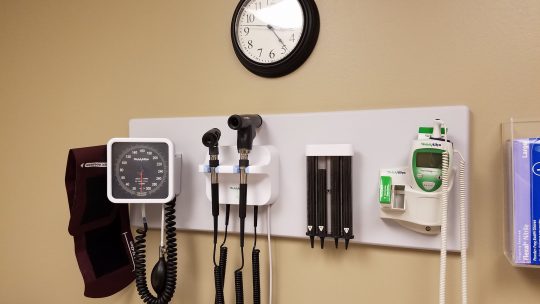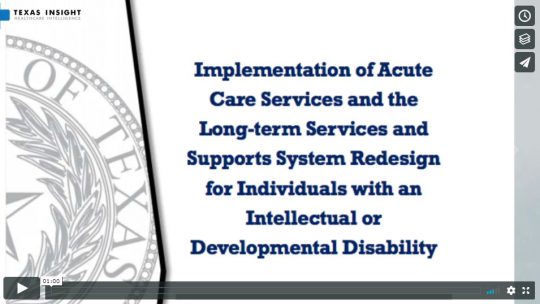Search Results for: 1

HHSC: Behavioral Health Advisory Committee
MEETING SUMMARY.
The Behavioral Health Advisory Committee gathered for their quarterly meeting. [The Committee] provides customer/consumer and stakeholder input by making recommendations regarding the allocation and adequacy of behavioral health services and programs within the state of Texas. The Health and Human Services Commission (HHSC) established the Behavioral Health Advisory Committee (BHAC) as the state mental health planning council in accordance with the state's obligations under 42 U.S.C. §300x-3. The BHAC considers and makes recommendations to the HHS Executive Commissioner consistent with the committee’s purpose. Recommendations to Health and Human Services system agencies regarding behavioral health services include:Read more

HHSC: Intellectual and Developmental Disability System Redesign Advisory Committee
MEETING SUMMARY.
The Intellectual and Developmental Disability System Redesign Advisory Committee gathered for their quarterly meeting. Created by Senate Bill (SB) 7 of the 83rd Texas Legislature (Regular Session), [the Committee] will advise HHSC and the Texas Department of Aging and Disability Services (DADS) on the implementation of the acute care services and long-term services and supports (LTSS) system redesign for people with intellectual and developmental disabilities. SB 7 requires HHSC and DADS to design and implement an acute care services and LTSS system for people with IDD that supports the following goals:Read more

The Weekly Insight: January 29
Texas Insight’s Reports Texas Gun Violence as a Public Health Issue: This is the first posting in a series on gun violence in Texas and how it might be addressed as…
Read more

Texas Gun Violence as a Public Health Issue: Part II
Gun enthusiasts enjoy great freedoms in Texas. The state is known for firearm policies favoring gun ownership and the right for individuals to be armed in public. In fact, the…
Read more

Taxes and Fees Enacted as Part of the Affordable Care Act
Background and Provisions. The Patient Protection and Affordable Care Act (ACA; P.L. 111-148, as amended by P.L. 111-152) contains a number of tax provisions that serve different purposes. Some of the…
Read more

DNA Testing in Criminal Justice: Background, Current Law, and Grants
Summary. Deoxyribonucleic acid, or DNA, is the fundamental building block for an individual’s entire genetic makeup. DNA is a powerful tool for law enforcement investigations because each person’s DNA is different…
Read more

HHSC: Texas Autism Council
Meeting Summary. The Texas Autism Council met Tuesday, January 23, for their quarterly meeting. The council advises and makes recommendations to state agencies and the state Legislature to ensure that the…
Read more

HHSC: Texas Brain Injury Advisory Council
MEETING SUMMARY. The Council met to receive updates on subcommittees and to receive information on stroke and stroke prevention. The Texas Brain Injury Advisory Council address strategic planning, policy, rules, and…
Read more

The Weekly Insight: January 22
Texas Insight’s Recent Reports Starving the Beast in Texas Part IV: The Trump Administration has expressed its intention to tackle what they refer to as “welfare reform”. The administration seems to…
Read more


